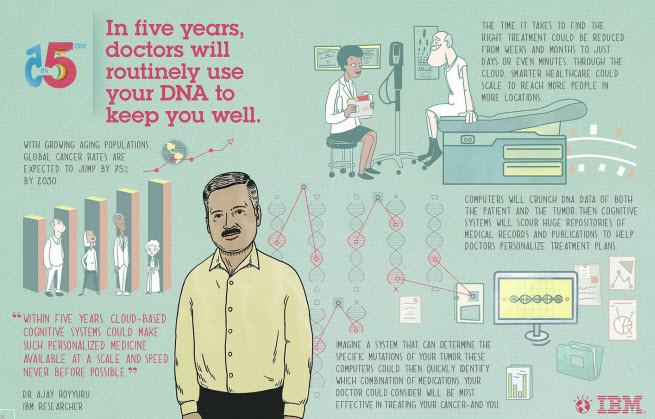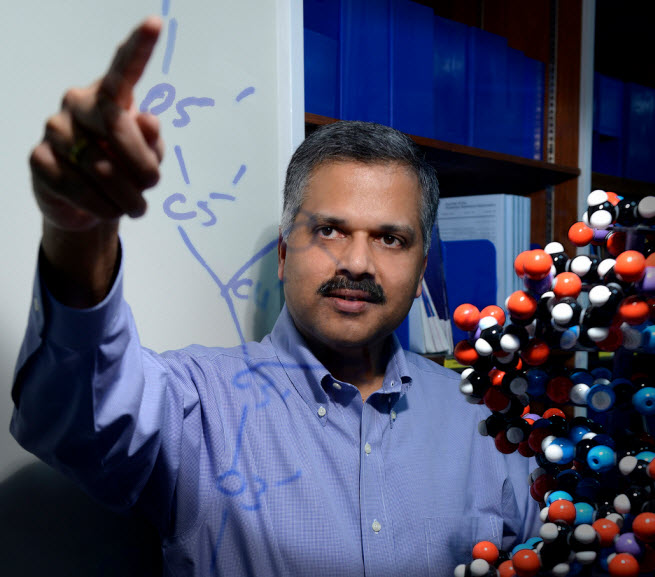
Above: In five years, buying local will beat online as you get online data at your fingertips in the store.
VB: Moving on to the next one, my first reaction to that was, poor Amazon.com. Do you think buying local is really going to beat e-commerce?
Meyerson: A vast number of people, if they had the option of going locally and having access to that kind of ease of use–You walk into a store and you’re basically using an app that they’ve supplied. Say you have a particular interest in SLR cameras. You’ve been looking online at both full-size ones and some of the new smaller versions. You’re not sure if your hands are too big to accommodate it. Imagine the ability to walk to a local shop and have it know that you’re interested in these things, and without having to track somebody down, it says, “Would you like me to show you this particular camera? Would you like someone to meet you in Aisle 3, Section 2?”
The ability to do something painlessly, to have the hands-on experience without the hassle of trying to find help and locate the item, that’s very powerful. Similarly, when you go into a store—For instance, the neighborhood store where you get your groceries. If that store has the ability to know your preferences, it might say as you walk in, “You haven’t bought your favorite non-wheat-based bread in two weeks. I know you buy that every two weeks. You might be running low. The spelt bread is on Aisle 2.”
Making that personal set of information available to you instantly and easily, it’s very interesting. You’re not talking about two-day delivery. Not to mention, it’s very green, because you’re not dragging something halfway across the country, only to ship it all the way back the next day because it doesn’t fit. There’s a lot to be said for that. Looking at certain classes of purchases, where people want to get their hands on it, the trick is to make it as easy as it would be online. That means it’s instantly in your hands. It’s delivered immediately. You don’t have to hike around looking for it.
Right now, the experience at a typical big-box store doesn’t resemble what I’ve described. But it will get there.
VB: It almost sounds like a return to Webvan there. I don’t know if you guys have thought about that. Also, is there any additional privacy concern on this front, buying local as opposed to buying on Amazon?
Meyerson: That’s the question. How private are you at Amazon? They know all your preferences. They have a record of everything you’ve done. They have virtually all your personal information.
VB: The thing I don’t necessarily want everybody to know—Say I have 10 bottles of wine in my refrigerator.
Meyerson: That’s a good point. This is actually done electronically, not necessarily with human intervention. It’s certainly more private than going to the store and just loading up a bucket with 10 bottles. The difference here is, it can be delivered in what amounts to a box. You pick it up and walk out the store and no person has a clue what you did.
Whether it’s online or in the store, it’s all handled electronically. You’re no more or less exposed. It’s just that in one case, you have your 10 bottles, which you want to take home with 10 straws and have a good evening.
VB: What’s interesting is that this area has always been about physical retail against online. It almost seems like you’re combining the two in some way.
Meyerson: Exactly. Because of the change in technology and the availability of cloud, where you can run this stuff remotely on somebody else’s nickel, we turn it into pure op-ex, as opposed to a massive cap-ex investment. Even little mom-and-pop stores can offer the same services.
You’re combining the best of both worlds. On the one hand, you have a very personal relationship, which some people do prefer. At the same time, the technology they have available to serve you is as good as anything that’s been available in online shops. It’s an interesting evolution, and it is coming. A large number of things, you do want to get your hands on them and see them in person before you buy them. As you probably have heard, there are a number of online shops that have talked about setting up brick-and-mortar showrooms, for this precise reason.

Above: In five years, doctors will routinely use your DNA to keep you well.
VB: Next up, doctors and DNA.
Meyerson: We put these down before all the recent announcements you’ve seen about the guys who are using DNA and other markers to re-engineer white cells and go after blood cancers. It’s quite striking. If you have enough horsepower, you can collect a vast amount of information about various diseases, various cancers and such, and you can start aligning them with the DNA knowledge that we gain from the ability to sequence people’s DNA in a reasonably short time and at a reasonably low cost.
Once you’re doing that, think about the tailored effects, as opposed to the nuclear option of chemotherapy. The whole point is, DNA indicators will let you target particular results, target particular cocktails or any other chemical treatment in a way that minimizes damage to innocent tissue and maximizes damage where you want it. If you can get something that is absolutely chemically specific to the surface of a cancer cell, you then eliminate the side effects that would be associated with applying what amounts to a poison to the body.
Targeted therapies based on DNA understanding, and the ability to correlate the DNA attributes of a given person against the results of a particular treatment protocol, that is a huge protocol. It’s starting. The reason it’s 5 in 5 is because we’re just now beginning to hear some astonishing results. In five years, it won’t be unusual.
VB: The other thing that made some news was 23andMe and the FDA. The FDA was concerned about inaccurate DNA reports that might cause you to make the wrong decision, and that there was no oversight of this. That caused 23andMe to retreat a bit and say, “Okay, we’ll wait on that and do our ancestry research in the meantime.” How much of that is going to maybe interrupt this process here?
Meyerson: I have no idea what 23andMe did by way of background research or anything else. But I don’t think it’ll have any impact here. There were always going to be early movers taking risks. There was always going to be the issue of folks who don’t have enough data yet. But the key point is, data is being gathered on a global scale.
As you get these enormous data warehouses, you can see the alignment between these particular markers within the DNA and a clinical result based on some protocol, and you start lining up all the cases. If you have this particular DNA market, you’re also subject to this disease. Here’s the protocol that’s most likely, in prior times, beaten that disease. Just that information alone – the ability to target a treatment – is monumental.
Today, they just have a book of best practices that they apply uniformly, because there is no use of DNA on a broad scale to aim treatments. There are targeted cases. The difference is, this will become pervasive in the next five years. You’ll reach a point where one of the first steps, if you have a serious disease, will be to take a look at your DNA and see if one of the magic bullets that have been identified over the course of several years applies to your case.
That’s what they’re finding, by the way. They’re finding magic bullets, as we’ve seen in the recent oncology results. It’s stunning. These are people who were on what would amount to their last leg, and they’ve ended up thriving because they had the right knowledge of how to treat that particular problem, based on a very specific characteristic found in their DNA.
VB: The question that comes up, if we get too good at treating these diseases, do we have an overpopulation problem? Has some thought gone into that issue as well?
Meyerson: There are a lot of very benign ways of controlling population that don’t involve killing people. [laughter] I’ll stop there, because that’s an easy one. I’m not sure anyone’s planning on population control through any more draconian effort than what people practice today.

